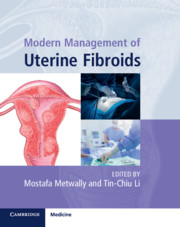Book contents
- Modern Management of Uterine Fibroids
- Modern Management of Uterine Fibroids
- Copyright page
- Contents
- Contributors
- Foreword
- Chapter 1 Pathophysiology of Uterine Fibroids
- Chapter 2 Evaluation of Uterine Fibroids Using Two-Dimensional and Three-Dimensional Ultrasonography
- Chapter 3 Ulipristal and Other Medical Interventions for Treatment of Uterine Fibroids
- Chapter 4 The Role of Magnetic Resonance Imaging in the Management of Fibroids
- Chapter 5 Fibroids and Fertility
- Chapter 6 Fibroids and Reproduction
- Chapter 7 Open Myomectomy
- Chapter 8 Laparoscopic and Robotic Myomectomy
- Chapter 9 Principles and Technique of Laparoscopic Myomectomy
- Chapter 10 Uterine Fibroids
- Chapter 11 Total Laparoscopic Hysterectomy for the Fibroid Uterus
- Chapter 12 Hysteroscopic Resection of Submucosal Fibroids
- Chapter 13 Modern Management of Intramural Myomas
- Chapter 14 Outpatient Myomectomy
- Chapter 15 Vaginal Hysterectomy with Fibroids
- Chapter 16 Leiomyosarcoma
- Chapter 17 MRI-Guided Ultrasound Lysis of Fibroids
- Chapter 18 Embolization for the Management of Uterine Fibroids
- Chapter 19 Uterine Fibroids in Postmenopausal Women
- Appendix: Video Captions
- Index
- References
Chapter 18 - Embolization for the Management of Uterine Fibroids
Published online by Cambridge University Press: 10 October 2020
- Modern Management of Uterine Fibroids
- Modern Management of Uterine Fibroids
- Copyright page
- Contents
- Contributors
- Foreword
- Chapter 1 Pathophysiology of Uterine Fibroids
- Chapter 2 Evaluation of Uterine Fibroids Using Two-Dimensional and Three-Dimensional Ultrasonography
- Chapter 3 Ulipristal and Other Medical Interventions for Treatment of Uterine Fibroids
- Chapter 4 The Role of Magnetic Resonance Imaging in the Management of Fibroids
- Chapter 5 Fibroids and Fertility
- Chapter 6 Fibroids and Reproduction
- Chapter 7 Open Myomectomy
- Chapter 8 Laparoscopic and Robotic Myomectomy
- Chapter 9 Principles and Technique of Laparoscopic Myomectomy
- Chapter 10 Uterine Fibroids
- Chapter 11 Total Laparoscopic Hysterectomy for the Fibroid Uterus
- Chapter 12 Hysteroscopic Resection of Submucosal Fibroids
- Chapter 13 Modern Management of Intramural Myomas
- Chapter 14 Outpatient Myomectomy
- Chapter 15 Vaginal Hysterectomy with Fibroids
- Chapter 16 Leiomyosarcoma
- Chapter 17 MRI-Guided Ultrasound Lysis of Fibroids
- Chapter 18 Embolization for the Management of Uterine Fibroids
- Chapter 19 Uterine Fibroids in Postmenopausal Women
- Appendix: Video Captions
- Index
- References
Summary
Uterine fibroids are the most common benign tumour in premenopausal women, with a lifetime prevalence of almost 70% in Caucasian women and more than 80% in women of Afro-Caribbean descent. About half of these women experience symptoms, with the most common being menorrhagia, dysmenorrhoea, pressure symptoms and infertility. Whilst hysterectomy is still the most commonly offered and performed operation to treat uterine fibroids, over the last 20 years minimally invasive therapies have been gaining popularity and uterine fibroid embolization is now a mainstream option for most women who wish to preserve their uterus. Since its introduction, a strong body of evidence has built demonstrating safety and efficacy with low rates of complication. Uterine fibroid embolization (UFE) was first described as a treatment for symptomatic leiomyomas in 1995 by Ravina et al. and has proved so popular that in the last year there were over 25,000 uterine fibroid embolization procedures performed worldwide [1].
Information
- Type
- Chapter
- Information
- Modern Management of Uterine Fibroids , pp. 173 - 183Publisher: Cambridge University PressPrint publication year: 2020
